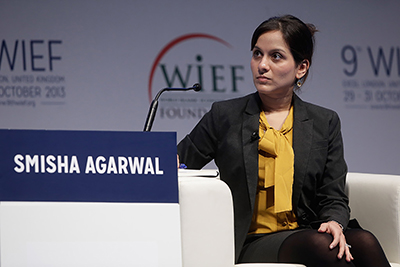Smisha Agarwal, PHD, MPH, MBA
Assistant Professor, International Health
Global Disease Epidemiology and Control Program

For over a decade, the Department of International Health has been a leader in the new and quickly evolving field of digital health. The Department has been at the forefront of using digital technology, such as mobile phones, to help expand health services to hard-to-reach and vulnerable populations in low- and middle-income countries. Faculty, students and alumni have also been central in shaping frameworks and defining terminology, essential building blocks of a new field. To maintain this leadership, the Department recently recruited Assistant Professor Smisha Agarwal, one of the top researchers and practitioners in the field, as our first tenure-track faculty for digital health.
"Having Smisha join the faculty represents an important step for the Department,” says Associate Professor Alain Labrique who directs the Johns Hopkins Global mHealth Initiative. “She has been instrumental in establishing standards for methodologic rigor in this emerging field. Her thought leadership is exciting to have as a resource to faculty and students engaged in innovative research across the Bloomberg School and other divisions of Johns Hopkins."
Agarwal is a population health scientist and epidemiologist whose work focuses on how community health systems can strengthen the delivery of primary health care services among disadvantaged and vulnerable populations. Her research seeks to understand how routine monitoring data can be leveraged using advanced analytical approaches, including machine learning, to enhance our understanding of quality and effectiveness of reproductive health services. She also investigates the effectiveness of digital clinical decision support tools in strengthening primary health care. In April this year, Agarwal was part of the launch of the WHO Guideline: recommendations on digital interventions for health system strengthening. In collaboration with colleagues from around the world, Agarwal helped lead a series of Cochrane reviews that were foundational to the development of the guideline, WHO’s first on digital health. Agarwal was also a member of the WHO Guideline Development Group, which reviewed and approved the final guideline. The 10 recommendations aim to harness the power of digital technology to help achieve universal health coverage. And they emphasize the importance of digital health in reaching vulnerable and hard-to-reach populations.
The Group, which was co-chaired by Associate Professor Alain Labrique, also examined and interpreted the evidence and formulated the final evidence-based recommendations.
“The guidelines are the result of nearly a decade of work by several Hopkins faculty and other colleagues dedicated to solving age-old health problems in unconventional and innovative ways,” says Agarwal. “Digitizing health care holds great promise and many governments are eager to leapfrog limitations in infrastructure and skills using digital devices. These guidelines are a first and critical step to providing this essential guidance.” Now at Hopkins, she is leading a multi-country project investigating incentive structures for community health workers. The project, based in Uganda, Kenya, Bangladesh, and Haiti, is a collaborative endeavor with the Population Council, USAID in-country missions, UNICEF offices and NGO and government partners in each of the countries, to understand the types of incentive packages that would enhance job satisfaction, effectiveness and retention of community health workers. The results should help inform national strategies to strengthen community health systems approaches.
Before joining Hopkins, Agarwal was with the Population Council leading the Frontline Health project, which focused on harmonizing metrics to monitor the performance of community health worker programs in seven countries and developing a research agenda to address critical gaps in scaling up community health worker projects globally.
She was also the founder and CEO of Global Health Bridge, a non-profit that develops technological solutions to make health service delivery more effective in India. The organization spearheaded the development of the Maternal Health Reporter, a mobile-based platform designed for community health workers working in areas where the health infrastructure is lacking. Agarwal has also worked in the private NGO-sector. At MEASURE Evaluation, for instance, she helped conduct large-scale impact evaluations. As a research fellow at FHI360, her work led to her interest in the development of clinical decision support tools for reproductive health that can bring the benefits of technology to low-income populations around the world.
Agarwal earned a PhD from the UNC Gillings School of Global Public Health and her MBA and MPH from Johns Hopkins. A native of India, she did her undergraduate work at Maharashtra University of Health Services. With other faculty and a number of external partners, she is exploring ways to expand the digital health curriculum at the School, including the development of a series of skills-focused courses.
